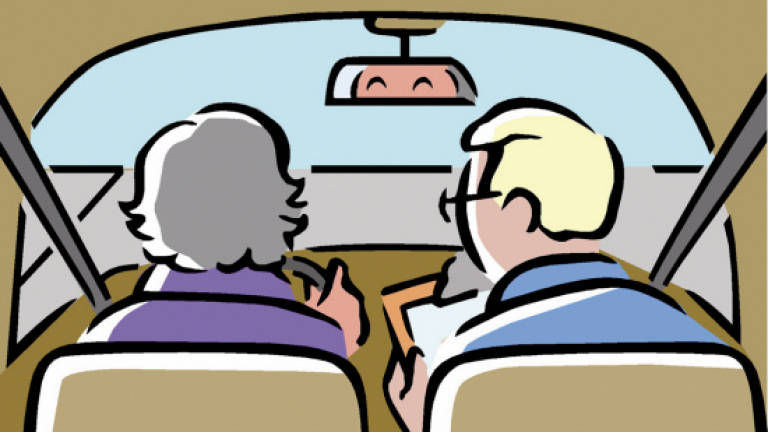Time to quit driving

ARE YOUR elderly parents still driving? If they are fit and able, there's no reason why they shouldn't do so. But as they age, their health may deteriorate.
So when do you ask them to hang up the car keys for good?
Going for a short test run with your parent at the wheel will give you an idea if he/she is still able to handle the car.
Does he/she drift into other lanes, or keep the signal lights on long after making a turn?
Is he/she often startled by cars or pedestrians who "suddenly" appear out of the blue? Does he/she often reverse into curbs?
What about any problem reading road signs? Is he/she having difficulty turning his/her neck around? Does he/she drive at turtle speed?
Remember, our elders may be displaying a couple of the symptoms above, but it does not mean they are unable to drive safely.
Still, it may be prudent to start curtailing their driving if they are getting on in years. Limit them to town driving during the day, for instance.
If they have been having too many minor scares or near-misses, it's high time to have a candid talk with your parents about quitting driving. Don't wait until an accident occurs.
A case in point: My 70-year-old aunt had been having dizzy spells but she continued to drive, until one unfortunate day when she crashed her car into someone's house.
What if your parents will not cooperate? For a major part of their lives, they have been used to having the freedom to move around as and when they please.
Not being able to drive is tantamount to losing their independence and self-sufficiency.
Present other options so that they do not feel debilitated by their lack of wheels.
If they live near a bus or train station, public transportation might work for them, provided they are physically able.
They also have the option of taking a taxi, Uber or Grab.
Be prepared to offer your services as their personal chauffeur.
This will be the most attractive option to them, as they would get to spend time with you as well.
If you have siblings who live in the area, arrange some sort of roster among yourselves.
If none of your close family members live in the same vicinity as your parents, you can enlist the help of friends.
Despite preparing alternative plans for their transportation, your parents may still be reluctant to relinquish their freedom.
Don't be afraid to bring in professionals if the situation warrants it.
Get a physician or an optometrist to prescribe the "no driving" solution. Elderly people tend to regard doctors' advice highly.
But if your parents are stubborn, or medical professionals themselves, then this tactic won't work.
In that case, ask a persuasive senior who has given up driving to coax them with his experience of being chauffeur-driven to wherever he wants to go. A strong testimonial may change their minds.
If despite everything that you have said or done, your parents still refuse to hand in their car keys, there is one last resort: confiscate the keys.
Give them the advice they constantly dished out during your growing up years: "I'm doing this for your own good."
Lydia Teh is a mother of four and author of nine books, including the latest, Cow Sense for Young People. Send comments to lifestyle.lydia@thesundaily.com.